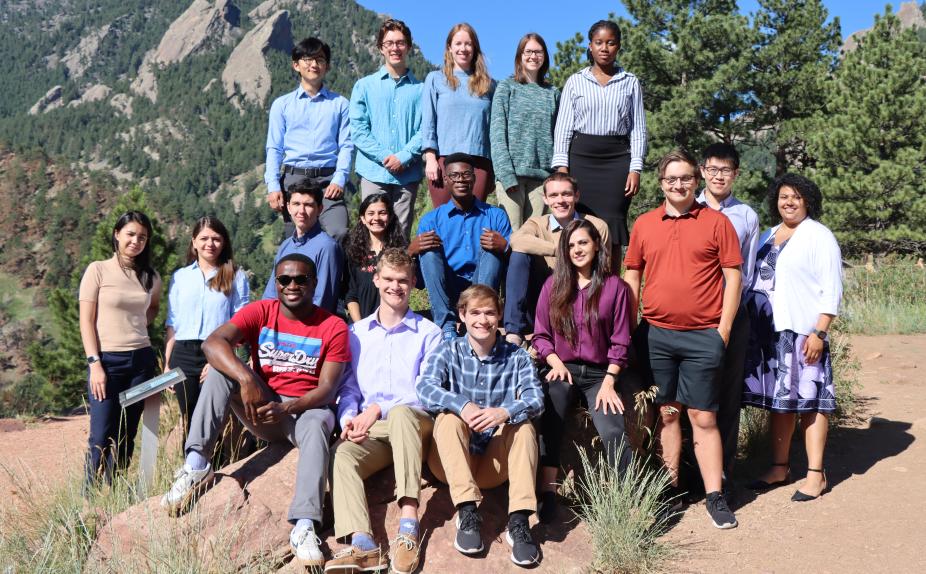2022 Presentations
Students in CISL’s SIParCS internship program will make their oral presentations on July 26 and 27 in the Main Seminar Room of the NCAR Mesa Lab in Boulder.

SIParCS interns in 2022 near the NCAR Mesa Lab in Boulder, Colo.
Anyone interested can attend via live webcast – including students’ family, friends, and others – but the Mesa Lab is not yet open to the public. In person attendance is limited to NCAR, UCAR, and UCP staff.
Attendees will be able to submit questions via Slido. The presentations will be recorded and published for those who cannot attend.
Tuesday, July 26 (MDT)
8:15 a.m. Introduction: Virginia Do, CISL
8:20 a.m. - “Neural Network for Winter Weather Precipitation Type Prediction” Justin Willson, Stony Brook University
Followed immediately by “XAI and Active Learning for Predicting Winter Weather Precipitation Type” Eliot Kim, University of Wisconsin-Madison
9:00 a.m. - “Collecting and Processing Point Cloud Data for Snow Depth and Density Measurement” Fletcher Wadsworth, University of Wyoming
9:20 a.m. - Break
9:30 a.m. - “Forecasting the COVID-19 Pandemic: Using Ensemble Data Assimilation to Enhance and Guide Models to More Reliable Predictions” Shaniah Reece, University of Maryland, Baltimore County
9:50 a.m. - “Expanding GeoCAT's Visualization Capabilities” Daphne Quint, University of Colorado, Boulder
10:10 a.m. “Demonstrating cloud-based remote sensing data workflows with xarray” Emma Marshall, University of Utah
10:30 a.m. - Break
10:40 a.m. - “Project Pythia Content Creation - A Intake Cookbook” James Morley, Utah Valley University
11:00 a.m. - “Improving the Speed and Scalability of the Data Assimilation Research Testbed” Ed Liu, Drexel University
11:20 a.m. - “Python Reimplementation of Fortran subroutines: Bilinear Interpolation” Alina Guha, Grinnell College
11:40 a.m. - “Measuring GPU Power consumption using NVIDIA tools” Daniel Hope, CUNY Bronx Community College
Wednesday, July 27 (MDT)
8:15 a.m. Introduction: Virginia Do, CISL
8:20 a.m. - “Exploring performance of GeoCAT data analysis routines on GPUs” Haniye Kashgarani, University of Wyoming
8:40 a.m. - “Developing a Scientific Data Search Engine: Architecture & Technologies” Teagan Johnson, Carleton College
Followed immediately by “Developing a Scientific Data Search Engine: Features & Results” Sabira Duishebaeva, Berea College
9:20 a.m. - Break
9:30 a.m. - “pyTIER: Development of a Python Knowledge-based weather station interpolation algorithm” Mozhgan A. Farahani, University of Colorado Denver
9:50 a.m. - “Python Visualization, Analysis, & Jupyter Notebook Development for Unstructured Grids” Philip Chmielowiec, University of Illinois at Urbana-Champaign
10:10 a.m. - “Increasing the portability and reproducibility of a scientific application using containers and Spack” Joe Ammatelli, University of Washington
10:30 a.m. - Break
10:40 a.m. - “Parallel Algorithms to Recognize Spatial Patterns in Climate Analysis” Anil Alper, Grinnell College
11:00 a.m. - “Development of Computational Tools and Educational Resources to Support Pi-WRF Community Driven Learning Modules” ’Joba Adisa, Clemson University
11:20 a.m. - “The CODE Intern Who Didn't Need To Code To Make An Impact: Crafting Community As A Stepping Stone For Discovery For SIParCS Interns” Francesgladys Pulido, Pennsylvania State University